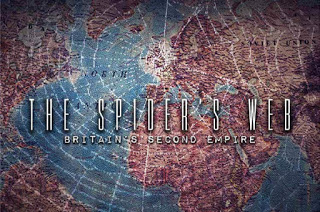The Spider's Web explores how London became the money-laundering capital of the world We released The Spider’s Web: Britain’s Second Empire for free download in mid-September and close to half a million people have viewed this film since its release. Here’s why I think it is resonating with audiences across the world. The Spider’s Web is a documentary about how the City of London emerged from the demise of the British Empire in the 1950s and re-established itself as the leading global financial centre. The mainstream narrative is that British bankers and lawyers are particularly adept at providing financial services to big corporations and wealthy elites across the world, British justice is trusted across the planet, and London provides a politically stable and competitive base for
Topics:
Mike Norman considers the following as important:
This could be interesting, too:
Robert Vienneau writes Austrian Capital Theory And Triple-Switching In The Corn-Tractor Model
Mike Norman writes The Accursed Tariffs — NeilW
Mike Norman writes IRS has agreed to share migrants’ tax information with ICE
Mike Norman writes Trump’s “Liberation Day”: Another PR Gag, or Global Reorientation Turning Point? — Simplicius
The Spider's Web explores how London became the money-laundering capital of the world
We released The Spider’s Web: Britain’s Second Empire for free download in mid-September and close to half a million people have viewed this film since its release. Here’s why I think it is resonating with audiences across the world.
The Spider’s Web is a documentary about how the City of London emerged from the demise of the British Empire in the 1950s and re-established itself as the leading global financial centre. The mainstream narrative is that British bankers and lawyers are particularly adept at providing financial services to big corporations and wealthy elites across the world, British justice is trusted across the planet, and London provides a politically stable and competitive base for international finance. Much of that narrative is true. Wealthy elites do trust the British courts to protect their assets, even when they’ve been looted from the poorest countries. The City of London does indeed host a cluster of specialised banks and law firms which can provide sophisticated tax avoidance services to the biggest of multinational companies. But London also sits at the centre of a global web of offshore secrecy jurisdictions, which includes Bermuda, the British Virgin Islands, Cayman, the Channel Islands, Gibraltar, the Turks and Caicos, Gibraltar, and others, which allow rich and powerful players to dodge taxes, to escape regulations, to money-launder, to cheat their creditors, and to engage in a host of corrupt activities with almost total impunity from investigation and prosecution. In short The Spider’s Web details how Britain, and London in particular, was covertly turned into the money-laundering centre of choice for crooks from across the planet.
Many people will have sensed that something was not right about Britain’s tax haven empire, and those who have followed the Panama Paper and Paradise Paper stories will have read about the key role played by the British Virgin Islands and Bermuda in these revelations of top-end scandals. This did not happen by accident; behind the scenes, from the 1950s onwards, key players in the City were carefully manipulating laws and regulations to their advantage, and this was made all the easier by having access to remote islands in the Caribbean and elsewhere, beyond the prying eyes of journalists and crime investigators. My own investigations began in the 1980s when I returned home to Jersey to work inside one of the world’s top accounting firms. If you watch the film you will hear what my investigations uncovered. While working in Jersey I also witnessed corruption at the highest political level, and eventually ended up helping the Wall Street Journal to investigate a banking scandal which the Jersey authorities were desperate to bury. I also came to know former Jersey Senator Stuart Syvret, who we interviewed for The Spider’s Web in Saint Helier. If you watch the film you will hear from Stuart what happened when he uncovered an ugly scandal at Jersey’s main hospital and the lengths the authorities went to silence him. I know from discussions with audiences in many countries that viewers find the sequence when the good, honest Jersey bobby tries to drown out the interview using a motorcycle siren particularly disturbing.
The Spider’s Web strikes a chord with audiences because it confronts us with a truth that many people knew all along but have chosen to ignore. Corruption runs through banks, accounting firms and law firms, and the offshore secrecy jurisdictions that host them like the message running through a stick of rock. For decades our politicians have promised to crack down on Britain’s secrecy jurisdictions, and for decades little or nothing has been achieved. Democracy and the rule of law in Britain have been greatly diminished as a result of this failure. Britain’s economy is heavily dependent on dirty money inflows looted from across the world, and it will take a massive and radical change of course to escape from this overdependence on tax havenry. Efforts to clean up the City will be met with bitter and protracted resistance. Many bankers and lawyers will need to go to jail if we are to persuade these professions that the game is up on their monkey business. The Spider’s Web was launched mid-year in 2017, since when I’ve attended screenings across the world and discussed with a wide range of audiences. Many issues are raised, but the question that comes up most frequently is straightforward and challenging: “Why has The Spider’s Web not been screened by the BBC?” Good question.
Read more at:

